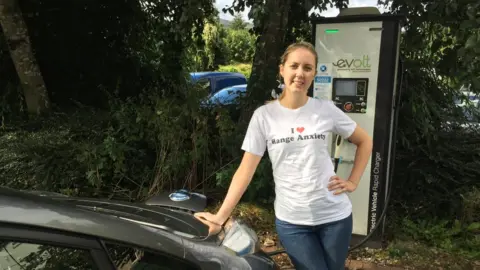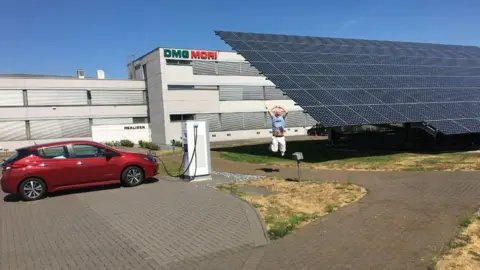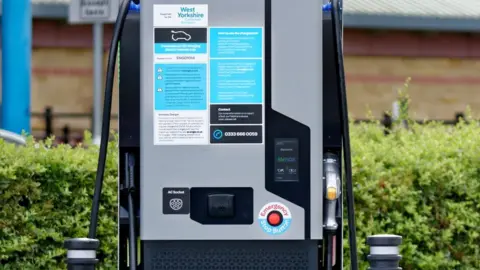'I saved £5,000 by charging my electric car for free'
 Elinor Chalmers
Elinor ChalmersElinor Chalmers knew that she would have to rely on public charging points when she bought her electric car.
The 36-year-old was living in a second floor flat in Dundee and could not plug in at home where it is usually cheaper.
She had no idea that the public charging points in her area were free to use.
"It was a pleasant surprise", says Elinor who got her Nissan Leaf because she was concerned about the impact of fossil-fuelled cars.
"The majority of the chargers across Scotland were free and I think in those first three years, I saved about £5,000 equivalent of what I would have been paying in diesel".
The devices which she relied upon are no longer free for everyone to use, but Radio 4's You & Yours has found that free charging is patchy but still widespread.
Figures the programme obtained from the electric vehicle (EV) charging website, Zap Map, show that of the 21,267 public charging points in the UK, more than one in five of them (4,928) are currently free to use.
"There are around a thousand charge points which you can use for free at supermarkets', says Zap Map's co-founder, Melanie Shufflebotham. 'There are thousands of [free] chargers at different locations such as attractions, zoos, retail parks, garden centres - all sorts of different places".
Roger Munford made the most of free charging on a road trip from his home in Southampton to Poland and back in 2018. He says he only spent £19 on electricity to power his electric car for the whole journey.
 Roger Munford
Roger MunfordZap Map says the majority of free charging devices in the UK are 7kw 'fast' chargers (which would typically add less than 30 miles of range to an EV in an hour) but there are also 442 'rapid' chargers (which can add over 150 miles of range in an hour).
These 50kw 'rapid' chargers tend to be focussed in different regions, according to Zap Map's Melanie Shufflebotham, who says while they are free for now, they "probably won't be" in future.
West Yorkshire is a case in point. There, the energy company Engie, has a network of 63 rapid charging points which are dotted around the Leeds and Bradford area and are currently free to use.
Engie is paying for the "100% renewable electricity" which those devices deliver in order to help stimulate take-up of electric vehicles in the region but it says that free charging will end on 29 October 2021.
 Engie
EngieIn Scotland, around 60% of public charging devices (so over 1,300 of them) are free to use, although motorists do have to pay an annual access fee of £20 to the operators, Chargeplace Scotland.
As in other parts of the UK, some local councils are paying for the electricity.
So how do they justify spending taxpayers' money on that, particularly when many people feel unable to go electric because of the relatively high purchase price of an EV?
"Local authorities are very keen to engage with the climate change agenda and encourage the take-up of electric vehicles', says Councillor David Renard, the Local Government Association's transport spokesperson. 'It's also about improving air quality".
He thinks that fewer councils will fund the perk as EV sales grow.
Some councils have moved away from it already, such as in Dundee where Elinor Chalmers used to live. The city council has since restricted free charging to certain residents, paid for through a Scottish government air quality improvement fund.
"I personally didn't choose to drive an EV just because it was free to charge," says Elinor, "at the end of the day the hosts of some of the chargers do need to at least cover their costs so it is realistic to be paying".
